In an op-ed published by Foreign Affairs on Tuesday, Taiwanese President Tsai Ing-wen warned that China’s increasingly aggressive behavior toward her island could be the prelude to an invasion that would be “catastrophic for regional peace and the democratic alliance system.”
“Emerging from the COVID-19 pandemic, authoritarian regimes are more convinced than ever that their model of governance is better adapted than democracy to the requirements of the twenty-first century,” Tsai wrote. “This has fueled a contest of ideologies, and Taiwan lies at the intersection of contending systems.”
Tsai said Taiwan’s “persistent embrace of democracy” puts it on the “frontlines of a new clash of ideologies,” and if Communist China succeeds in conquering Taiwan by force, “it would signal that in today’s global contest of values, authoritarianism has the upper hand over democracy.”
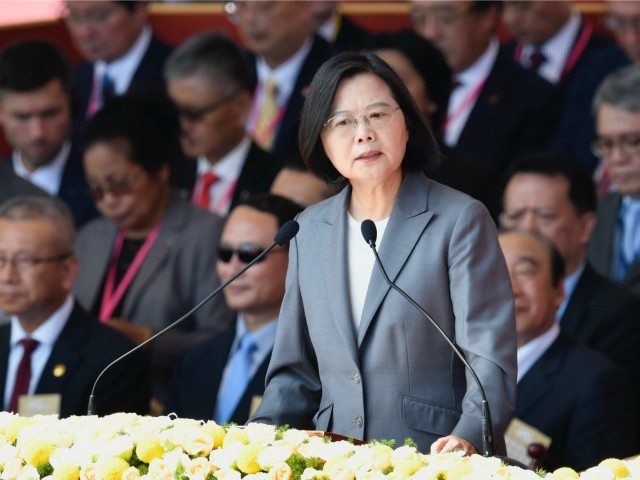
Taiwan President Tsai Ing-Wen speaks during National Day celebrations in front of the Presidential Palace in Taipei on October 10, 2019. (Sam Yeh/AFP via Getty Images)
Tsai also presented Taiwan as the pivot for Indo-Pacific policy in the coming decades, noting that if a democracy without military or territorial ambitions that are wholly committed to acting as a “responsible stakeholder” in the affairs of the region cannot survive, the stability of the entire region will be jeopardized.
“Taiwan lies along the first island chain, which runs from northern Japan to Borneo; should this line be broken by force, the consequences would disrupt international trade and destabilize the entire western Pacific,” she noted.
“In other words, a failure to defend Taiwan would not only be catastrophic for the Taiwanese; it would overturn a security architecture that has allowed for peace and extraordinary economic development in the region for seven decades,” she warned.
“Taiwan does not seek military confrontation. It hopes for peaceful, stable, predictable, and mutually beneficial coexistence with its neighbors. But if its democracy and way of life are threatened, Taiwan will do whatever it takes to defend itself,” Tsai concluded.
Chinese Communist Party (CCP) mouthpieces like Hu Xijin, editor of the state-run Global Times newspaper, are making sure China’s unprecedented incursions into Taiwan’s Air Defense Identification Zone (ADIZ) over the weekend are seen as threatening and intimidating:
As has often been the case over the past century, outside analysts are left wondering if China’s threatening flights are meant as psychological and political warfare, or if Beijing is gearing up to pull the trigger on kinetic warfare.
Most believe Taiwan’s defensive strategy, referenced by President Tsai in her op-ed, has succeeded in making an invasion too costly and risky for the CCP to contemplate. The swift victory that would be needed to keep the rest of the world from intervening on Taiwan’s behalf seems impossible, the casualties to China could be devastating enough to shake the CCP’s grip on power, the corresponding casualties in Taiwan could be horrifying enough to turn mainland Chinese against the CCP, and the prize for victory would be a devastated island of greatly reduced economic value to Beijing.
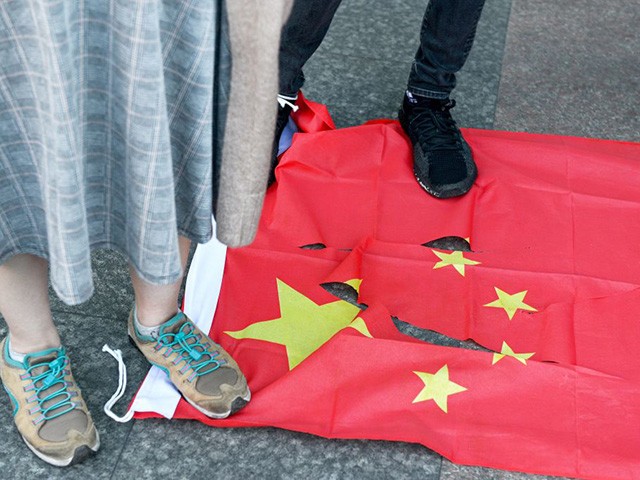
People stand on a torn Chinese national flag during a march in support of Save12, the campaign to save twelve Hong Kong pro-democracy activists, in central Taipei on October 25, 2020. (Chris Stowers/AFP via Getty Images)
Writing at Foreign Policy a week before China launched its massive incursions into Taiwan’s ADIZ, Michael Beckley and Hal Brants suggested the conventional analysis described above suffers from a crucial flaw: it presumes China is an ascending power, when in fact it might have already peaked and begun to decline.
Unfortunately, that could make China more dangerous and more willing to roll the dice on an invasion of Taiwan:
A country whose relative wealth and power are growing will surely become more assertive and ambitious. All things equal, it will seek greater global influence and prestige. But if its position is steadily improving, it should postpone a deadly showdown with the reigning hegemon until it has become even stronger. Such a country should follow the dictum former Chinese leader Deng Xiaoping laid down for a rising China after the Cold War: It should hide its capabilities and bide its time.
Now imagine a different scenario. A dissatisfied state has been building its power and expanding its geopolitical horizons. But then the country peaks, perhaps because its economy slows, perhaps because its own assertiveness provokes a coalition of determined rivals, or perhaps because both of these things happen at once. The future starts to look quite forbidding; a sense of imminent danger starts to replace a feeling of limitless possibility. In these circumstances, a revisionist power may act boldly, even aggressively, to grab what it can before it is too late. The most dangerous trajectory in world politics is a long rise followed by the prospect of a sharp decline.
…
Slowing growth makes it harder for leaders to keep the public happy. Economic underperformance weakens the country against its rivals. Fearing upheaval, leaders crack down on dissent. They maneuver desperately to keep geopolitical enemies at bay. Expansion seems like a solution—a way of grabbing economic resources and markets, making nationalism a crutch for a wounded regime, and beating back foreign threats.
Beckley and Brants suggested the CCP might see its “geopolitical window of opportunity” closing for forcing reunification with Taiwan, a goal China’s dictator Xi Jinping has explicitly laid out.
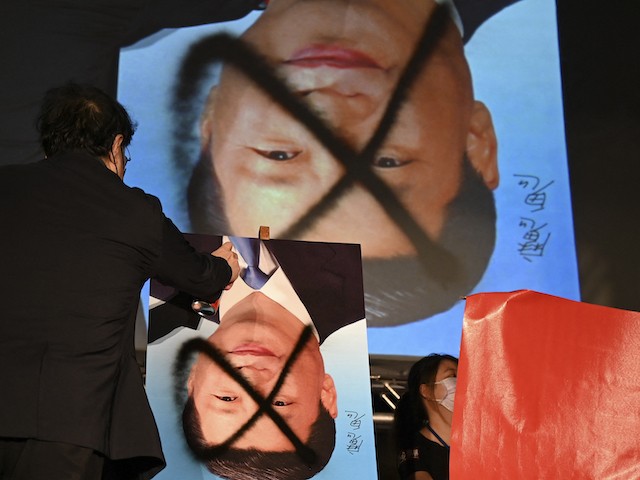
A demonstrator sprats paint over an upsidedown portrait of Chinese leader Xi Jinping during an anti-China rally outside the parliament in Taipei on October 1, 2021. (Sam Yeh/AFP via Getty Images)
China faces crushing demographic collapse and severe resource challenges in the decades ahead, while Xi’s cult of personality has “relentlessly pursued the centralization of power at the expense of economic prosperity.” Asian “resistance to Chinese power is stiffening,” with a good deal of help from Taiwan.
“China will be sorely tempted to use force to resolve the Taiwan question on its terms in the next decade before Washington and Taipei can finish retooling their militaries to offer a stronger defense,” the authors concluded, finding the moment of greatest danger lurking in the “late 2020s,” when the U.S. begins retiring aging ships and planes and gives China its last foreseeable chance of “seizing Taiwan and dealing Washington a humiliating defeat.”
Stan Grant at Australia’s ABC News on Monday feared the weekend’s aerial incursions could mean the danger is even closer, as Chinese generals consider making their move before the new Australia-U.K.-U.S. military pact can shift the regional balance of power, and Xi Jinping finds himself increasingly in need of a distraction from growing domestic problems.
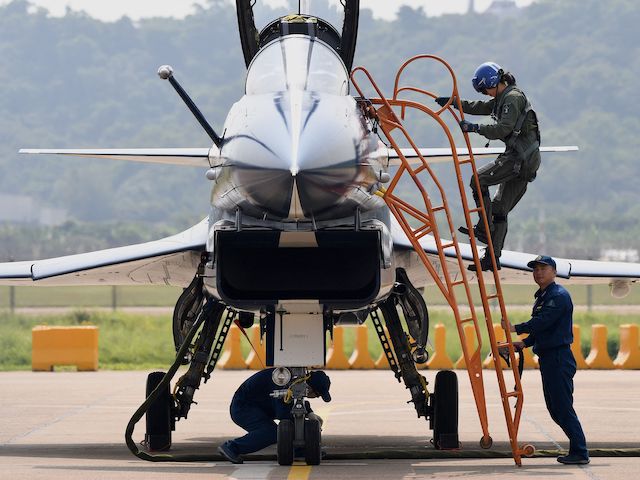
A female pilot exits the cockpit of a Chengdu Aircraft Corporation’s J-10 for the People’s Liberation Army Air Force (PLAAF) after a flight demonstration program at the 13th China International Aviation and Aerospace Exhibition in Zhuhai, China, on September 28, 2021. (Noel Celis/AFP via Getty Images)
The weakness of the Biden administration after its disaster in Afghanistan would surely be a factor in China’s calculations, and Grant mentioned one other point worth considering: reclaiming Taiwan would be Xi’s best shot at eclipsing CCP founder Mao Zedong in regime history books by completing the Communist revolution.
Xi is 68 years old, so he might not want to wait for the late 2020s to lock in that achievement – especially if China’s growing economic and resource crises are even worse than they appear, as observers who long ago learned to doubt Beijing’s official pronouncements suspect. If Tsai is correct that the fall of Taiwan would be a catastrophic defeat for freedom in the 21st-century war against authoritarianism, Xi might be worried that leaving Taiwan alone to thrive for another decade could be an equally devastating defeat for his brand of fascism.
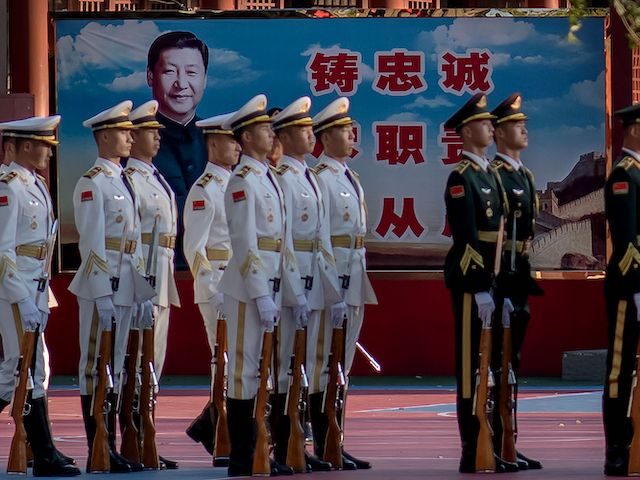
COMMENTS
Please let us know if you're having issues with commenting.